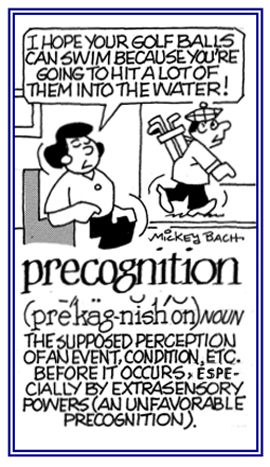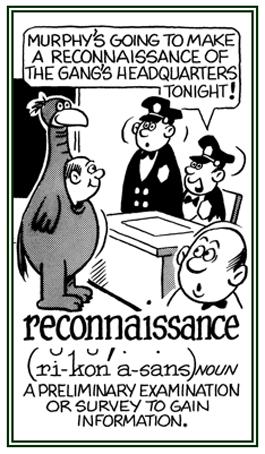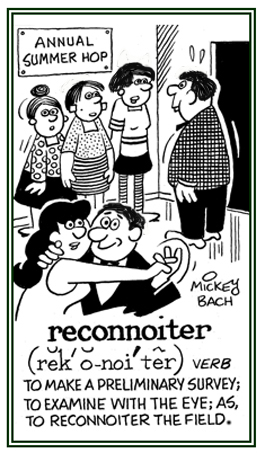cogni-, cogn-, cognosc-
(Latin: know, learn; comprehend, perceive)
1. An insight and realization of the process of one’s own thoughts; especially, regarded as having a role in directing those procedures: Since June had to learn German vocabulary words for the next day, she was mindful to use the same strategy as always, or metacognition; so, she turned off the music in her room, and went over only a few new words at a time, and wrote them down several times.
2. Knowledge of one's own thoughts and the factors that influence their thinking: Jack's metacognition was based on his family life when he was growing up and he was quite aware of this when making the decision to study rather than to just help out at the gas station.
2. Knowledge of one's own thoughts and the factors that influence their thinking: Jack's metacognition was based on his family life when he was growing up and he was quite aware of this when making the decision to study rather than to just help out at the gas station.
metacognitive (adjective), more metacognitive, most metacognitive
A reference to or relating to thinking about or considering one's own mental processes: A person's metacognitive considerations involve an assessing or reviewing of a what is current and/or of previous knowledge; such as, determining the relevance of new information, and potentially revising beliefs regarding a subject.
It is important to develop metacognitive skills when learning something in order to concentrate and save time while studying certain subjects for school.
1. Foreknowledge regarding an upcoming event: In her dream, Rebecca had a precognition that her brother was going to visit her the next day, and sure enough, he did!
2. The extrasensory perception of a future event: It is said that some twins have a feeling of precognition for each other, knowing what the other one needs, or wishes for, or when he or she is in trouble.

© ALL rights are reserved.
Go to this Word A Day Revisited Index
2. The extrasensory perception of a future event: It is said that some twins have a feeling of precognition for each other, knowing what the other one needs, or wishes for, or when he or she is in trouble.

Go to this Word A Day Revisited Index
so you can see more of Mickey Bach's cartoons.
precognitive (adjective), more precognitive, most precognitive
Descriptive of being aware about something before it happens; especially, via extrasensory perception: Sally had a precognitive dream about her husband having an accident while driving to work during one hard winter day which turned out to be true.
1. The act of identifying someone or something on the basis of a past sighting or experience, the ability to do this, or the fact of being identified through having been seen or experienced before: Although Greg passed by Grace without any sign of recognition when he got off the bus, this occurred because his thoughts were focused on getting to work on time and he was close to being late.
2. Appreciation of the value of an achievement: Jim's pioneering work never got the recognition it deserved.
3. Acknowledgment of the existence or validity of something: Jack and Jill need recognition from the committee in order to proceed with the celebration.
4. Permission given by someone chairing a meeting to another person who has asked to speak: The head of the English department gave recognition to Mr. Smith who wanted to offer his opinion on the subject of grading.
5. The formal acceptance by one country of the independent and legal status of another country: Guatemala’s recognition of Belize ended the territorial controversy in 1991.
6. Something given or awarded as a token of acknowledgment or gratitude: Lynn was presented with a trophy as recognition of being the best improved violinist in the school orchestra.
7. The sensing and conversion of data into a machine-readable form by a computer: It is possible that handwriting can be transformed into a PC or laptop by certain means of recognition or coding.
8. In biology, the ability of molecules with complementary shapes to attach to one another: Enzyme-substrate and antibody-antigen interactions are two forms of recognition in the field of science.
2. Appreciation of the value of an achievement: Jim's pioneering work never got the recognition it deserved.
3. Acknowledgment of the existence or validity of something: Jack and Jill need recognition from the committee in order to proceed with the celebration.
4. Permission given by someone chairing a meeting to another person who has asked to speak: The head of the English department gave recognition to Mr. Smith who wanted to offer his opinion on the subject of grading.
5. The formal acceptance by one country of the independent and legal status of another country: Guatemala’s recognition of Belize ended the territorial controversy in 1991.
6. Something given or awarded as a token of acknowledgment or gratitude: Lynn was presented with a trophy as recognition of being the best improved violinist in the school orchestra.
7. The sensing and conversion of data into a machine-readable form by a computer: It is possible that handwriting can be transformed into a PC or laptop by certain means of recognition or coding.
8. In biology, the ability of molecules with complementary shapes to attach to one another: Enzyme-substrate and antibody-antigen interactions are two forms of recognition in the field of science.
The quality of being easily aware of something or being known: When learning German for the first time, easy words are taught and used over and over again, producing easy recognizability for the beginners who are learning the language.
recognizable (adjective), more recognizable, most recognizable
1. Concerning someone or something that is identifiable from a chance meeting or from knowledge; distinguishable: Shirley Temple was once the most recognizable face among movie actors and actresses.
2. Regarding the acceptance or approval of a claim, duty, fact, truth, etc.: The recognizable details in the business plan helped the small firm to receive a loan from the bank.
2. Regarding the acceptance or approval of a claim, duty, fact, truth, etc.: The recognizable details in the business plan helped the small firm to receive a loan from the bank.
1. A bond or obligation of record entered into before a court of record or a magistrate, binding a person to do a particular act: Tom's recognizance required him to clean up the park every day for six months.
2. A formal agreement made by someone before a judge or magistrate to do something: Jim was released on his own recognizance to appear in court on a specified date.
2. A formal agreement made by someone before a judge or magistrate to do something: Jim was released on his own recognizance to appear in court on a specified date.
Usually a person will be granted a release on personal recognizance when it is deemed by officials that it is highly unlikely that he or she will fail to appear in court.
3. A security agreed upon before a court with a requirement to perform some task ordered by law; otherwise, if the task is not complied with a penalty will be enforced: The recognizance that the judge demanded of the convicted woman was not fulfilled and so she had to serve a period of time in jail.
recognize (REK uhg nighz") (verb), recognizes; recognized; recognizing
1. To identify a thing or person as a result of having seen or had some other experience of him, her, or it before: While they were shopping in the supermarket, Sherry turned to her husband and said, "Jim, look at that couple over there. Do you recognize them as our former neighbors who moved away some years ago?"
2. To acknowledge someone's achievement; to show appreciation of, or give credit to, another's performance: The players hoped that people would recognize their success of the sports event by donating in a grand style!
3. To allow someone to speak at a meeting: The chairman recognized the representative who wanted to talk to the members of the staff.
4. To accept formally the independent and legal status of a country or regime: The administration refused to recognize the new military government.
5. To give or award something to a person as a token of acknowledgment or gratitude: The council recognized the soldier's bravery with a medal.
6. To show in some way that someone is personally known: Shirley recognized old friends in the crowd with a smile and a wave.
7. To accept the validity or truth of something: Ivan recognized that he was at fault for the failure of the project.
2. To acknowledge someone's achievement; to show appreciation of, or give credit to, another's performance: The players hoped that people would recognize their success of the sports event by donating in a grand style!
3. To allow someone to speak at a meeting: The chairman recognized the representative who wanted to talk to the members of the staff.
4. To accept formally the independent and legal status of a country or regime: The administration refused to recognize the new military government.
5. To give or award something to a person as a token of acknowledgment or gratitude: The council recognized the soldier's bravery with a medal.
6. To show in some way that someone is personally known: Shirley recognized old friends in the crowd with a smile and a wave.
7. To accept the validity or truth of something: Ivan recognized that he was at fault for the failure of the project.
recognized (adjective), more recognized, most recognized
Generally referring to something that is accepted as being true, valid, worthy, or proper: Henry was the recognized authority regarding the use of Latin in various languages.
1. The exploration or examination of an area to gather information; especially, about the strength and positioning of enemy forces: The army officials reviewed the different approaches to determine which would be the best way to make a reconnaissance of the enemy territory.
2. A preliminary inspection of an area to obtain geographic, hydrographic, or similar data prior to a detailed survey: The reconnaissance of the district to gather terrestrial information was interrupted when the road ran into a pasture and ended.
3. A preliminary research or investigation of something: There was a lot of reconnaissance done in the forested areas so that the report on rare birds in that area would be as complete as possible.

© ALL rights are reserved.
Go to this Word A Day Revisited Index
2. A preliminary inspection of an area to obtain geographic, hydrographic, or similar data prior to a detailed survey: The reconnaissance of the district to gather terrestrial information was interrupted when the road ran into a pasture and ended.
3. A preliminary research or investigation of something: There was a lot of reconnaissance done in the forested areas so that the report on rare birds in that area would be as complete as possible.

Go to this Word A Day Revisited Index
so you can see more of Mickey Bach's cartoons.
reconnoiter (ree" kuh NOI tuhr, rek" uh NOI tuhr) (verb), reconnoiters; reconnoitered; reconnoitering
1. To explore a region in order to gather information; especially, about the strength and positioning of enemy military forces: The special forces will reconnoiter the fighting zone to make sure it is accessible and can be properly analyzed.
2. An exploration of an area or a situation in order to gather information before making a decision as to what can be done: Ted and his family reconnoitered or investigated the forest area before deciding where they could pitch their tent for the night.
3. Etymology: from early 18th century via obsolete French reconnoître from Latin recognoscere, "to identify".

© ALL rights are reserved.
Go to this Word A Day Revisited Index
2. An exploration of an area or a situation in order to gather information before making a decision as to what can be done: Ted and his family reconnoitered or investigated the forest area before deciding where they could pitch their tent for the night.
3. Etymology: from early 18th century via obsolete French reconnoître from Latin recognoscere, "to identify".

Go to this Word A Day Revisited Index
so you can see more of Mickey Bach's cartoons.
Exploring in order to gain information: The soldiers realized that reconnoitering, or scouting, in enemy territory could be very dangerous.
A failure to identify someone or something: There was too much unrecognition of the workers by the contractor because he didn't show his appreciation of the excessively hard labor that was involved in completing the project.
unrecognizable (adjective), more unrecognizable, most unrecognizable
A reference to something that is very different from the place which or the person who is remembered; unidentifiable: Because of the amount of damage done by the storm, the neighborhood was almost completely unrecognizable as a result of so many of the buildings that were destroyed and all of the trees that were blown over.
Mary's guest was quite unrecognizable in the bear costume until finally someone knew it was Jack, the neighbor from across the street!
Inter-related cross references, directly or indirectly, involving word units meaning "know, knowledge; learn, learning": discip-; gno-; histor-; intellect-; learn, know; math-; sap-; sci-; sopho-.


